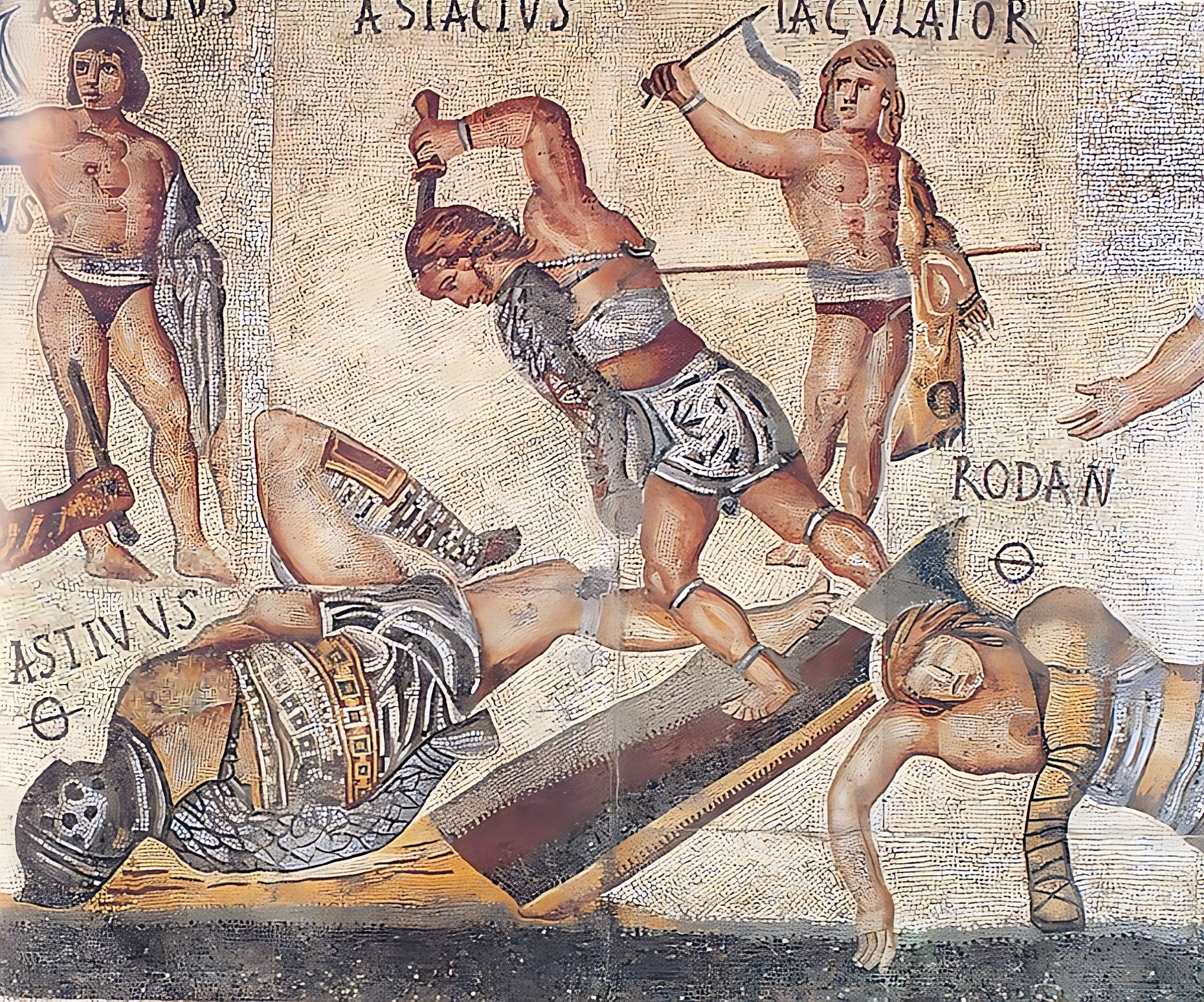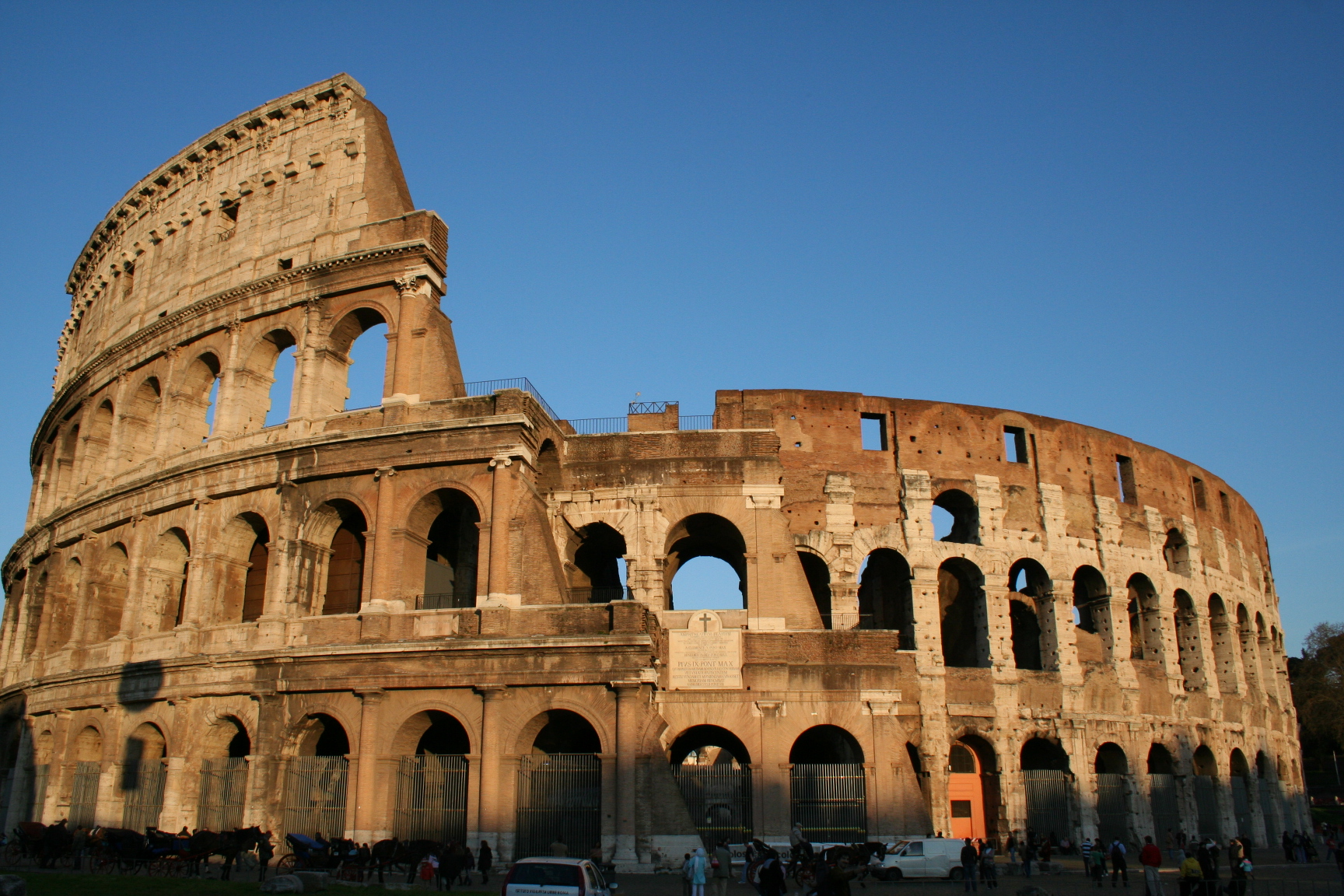|
Priscus (gladiator)
__NOTOC__ Priscus (fl. late 1st century AD) was a Roman gladiator of Celtic origins. His combat with Verus was the highlighted entertainment of the opening day games sponsored by Titus to inaugurate the Flavian Amphitheatre in AD 80. It was recorded in a laudatory poem by Martial — Liber Spectaculorum is the only known detailed description to survive of a gladiatorial fight. This laudatory poem was written to honor and to highlight all the events of Titus's games. Their fight marked the beginning of the celebration and concluded in a rare result. Both gladiators were declared victors of the match, and were unexpectedly awarded their freedom by the Emperor. Martial, liber de spectaculis 29: "As Priscus and Verus each drew out the contest and the struggle between the pair long stood equal, shouts loud and often sought discharge for the combatants. But Titus obeyed his own law (the law was that the bout go on without shield until a finger be raised). What he could do, he did, of ... [...More Info...] [...Related Items...] OR: [Wikipedia] [Google] [Baidu] |
Ancient Rome
In modern historiography, ancient Rome refers to Roman civilisation from the founding of the city of Rome in the 8th century BC to the collapse of the Western Roman Empire in the 5th century AD. It encompasses the Roman Kingdom (753–509 BC), Roman Republic (509–27 BC) and Roman Empire (27 BC–476 AD) until the fall of the western empire. Ancient Rome began as an Italic settlement, traditionally dated to 753 BC, beside the River Tiber in the Italian Peninsula. The settlement grew into the city and polity of Rome, and came to control its neighbours through a combination of treaties and military strength. It eventually dominated the Italian Peninsula, assimilated the Greek culture of southern Italy ( Magna Grecia) and the Etruscan culture and acquired an Empire that took in much of Europe and the lands and peoples surrounding the Mediterranean Sea. It was among the largest empires in the ancient world, with an estimated 50 to 90 million inhabitants, roughly 20% of t ... [...More Info...] [...Related Items...] OR: [Wikipedia] [Google] [Baidu] |
Gladiator
A gladiator ( la, gladiator, "swordsman", from , "sword") was an armed combatant who entertained audiences in the Roman Republic and Roman Empire in violent confrontations with other gladiators, wild animals, and condemned criminals. Some gladiators were volunteers who risked their lives and their legal and social standing by appearing in the arena. Most were despised as slaves, schooled under harsh conditions, socially marginalized, and segregated even in death. Irrespective of their origin, gladiators offered spectators an example of Rome's martial ethics and, in fighting or dying well, they could inspire admiration and popular acclaim. They were celebrated in high and low art, and their value as entertainers was commemorated in precious and commonplace objects throughout the Roman world. The origin of gladiatorial combat is open to debate. There is evidence of it in funeral rites during the Punic Wars of the 3rd century BC, and thereafter it rapidly became an essential fea ... [...More Info...] [...Related Items...] OR: [Wikipedia] [Google] [Baidu] |
Verus (gladiator)
Verus was a well-known gladiator during the reigns of the Emperors Vespasian and Titus in the later part of the 1st century. His combat with Priscus was the highlight of the opening day of the games conducted by Titus to inaugurate the Flavian Amphitheatre (later the Colosseum) in AD 80, and recorded in a laudatory poem by Martial — the only detailed description of a gladiatorial fight that has survived to the present day. Both gladiators were declared victors of the combat, and were awarded their freedom by the Emperor in a unique outcome. Martial, ''Liber de Spectaculis'', XXIX: Notes *The life and fate of Verus is the basis of the BBC #REDIRECT BBC #REDIRECT BBC Here i going to introduce about the best teacher of my life b BALAJI sir. He is the precious gift that I got befor 2yrs . How has helped and thought all the concept and made my success in the 10th board exam. ... ... documentary drama "Colosseum: Rome's Arena of Death" a.k.a.Colosseum: A Gladiator's Story (2 ... [...More Info...] [...Related Items...] OR: [Wikipedia] [Google] [Baidu] |
Inaugural Games Of The Flavian Amphitheatre
The inaugural games were held, on the orders of the Roman Emperor Titus, to celebrate the completion in AD 80 (81 according to some sources) of the Colosseum, then known as the Flavian Amphitheatre ( la, Amphitheatrum Flavium). Vespasian began construction of the amphitheatre around AD 70 and it was completed by his son Titus, who became emperor following Vespasian's death in AD 79. Titus' reign began with months of disasters – including the eruption of Mount Vesuvius, a fire in Rome, and an outbreak of plague – he inaugurated the completion of the structure with lavish games that lasted for more than one hundred days, perhaps in an attempt to appease the Roman public and the gods. Little literary evidence survives of the activities of the gladiatorial training and fighting (''ludi''). They appear to have followed the standard format of the Roman games: animal entertainments in the morning session, followed by the executions of criminals around midday ... [...More Info...] [...Related Items...] OR: [Wikipedia] [Google] [Baidu] |
Titus
Titus Caesar Vespasianus ( ; 30 December 39 – 13 September 81 AD) was Roman emperor from 79 to 81. A member of the Flavian dynasty, Titus succeeded his father Vespasian upon his death. Before becoming emperor, Titus gained renown as a military commander, serving under his father in Judea during the First Jewish–Roman War. The campaign came to a brief halt with the death of emperor Nero in 68, launching Vespasian's bid for the imperial power during the Year of the Four Emperors. When Vespasian was declared Emperor on 1 July 69, Titus was left in charge of ending the Jewish rebellion. In 70, he besieged and captured Jerusalem, and destroyed the city and the Second Temple. For this achievement Titus was awarded a triumph; the Arch of Titus commemorates his victory to this day. During his father's rule, Titus gained notoriety in Rome serving as prefect of the Praetorian Guard, and for carrying on a controversial relationship with the Jewish queen Berenice. Despite concerns o ... [...More Info...] [...Related Items...] OR: [Wikipedia] [Google] [Baidu] |
Colosseum
The Colosseum ( ; it, Colosseo ) is an oval amphitheatre in the centre of the city of Rome, Italy, just east of the Roman Forum. It is the largest ancient amphitheatre ever built, and is still the largest standing amphitheatre in the world today, despite its age. Construction began under the emperor Vespasian () in 72 and was completed in 80 AD under his successor and heir, Titus (). Further modifications were made during the reign of Domitian (). The three emperors that were patrons of the work are known as the Flavian dynasty, and the amphitheatre was named the Flavian Amphitheatre ( la, Amphitheatrum Flavium; it, Anfiteatro Flavio ) by later classicists and archaeologists for its association with their family name (Flavia (gens), Flavius). The Colosseum is built of travertine#Uses, travertine limestone, tuff (volcanic rock), and brick-faced Roman concrete, concrete. It could hold an estimated 50,000 to 80,000 spectators at various points in its history, having an average a ... [...More Info...] [...Related Items...] OR: [Wikipedia] [Google] [Baidu] |
Martial
Marcus Valerius Martialis (known in English as Martial ; March, between 38 and 41 AD – between 102 and 104 AD) was a Roman poet from Hispania (modern Spain) best known for his twelve books of ''Epigrams'', published in Rome between AD 86 and 103, during the reigns of the emperors Domitian, Nerva and Trajan. In these short, witty poems he cheerfully satirises city life and the scandalous activities of his acquaintances, and romanticises his provincial upbringing. He wrote a total of 1,561 epigrams, of which 1,235 are in elegiac couplets. Martial has been called the greatest Latin epigrammatist, and is considered the creator of the modern epigram. Early life Knowledge of his origins and early life are derived almost entirely from his works, which can be more or less dated according to the well-known events to which they refer. In Book X of his ''Epigrams'', composed between 95 and 98, he mentions celebrating his fifty-seventh birthday; hence he was born during March 38, 39, ... [...More Info...] [...Related Items...] OR: [Wikipedia] [Google] [Baidu] |
Julius Caesar
Gaius Julius Caesar (; ; 12 July 100 BC – 15 March 44 BC), was a Roman general and statesman. A member of the First Triumvirate, Caesar led the Roman armies in the Gallic Wars before defeating his political rival Pompey in a civil war, and subsequently became dictator from 49 BC until his assassination in 44 BC. He played a critical role in the events that led to the demise of the Roman Republic and the rise of the Roman Empire. In 60 BC, Caesar, Crassus and Pompey formed the First Triumvirate, an informal political alliance that dominated Roman politics for several years. Their attempts to amass power as were opposed by the within the Roman Senate, among them Cato the Younger with the frequent support of Cicero. Caesar rose to become one of the most powerful politicians in the Roman Republic through a string of military victories in the Gallic Wars, completed by 51 BC, which greatly extended Roman territory. During this time he both invaded Britain and built a b ... [...More Info...] [...Related Items...] OR: [Wikipedia] [Google] [Baidu] |
Roman Gladiators
A gladiator ( la, gladiator, "swordsman", from , "sword") was an armed combatant who entertained audiences in the Roman Republic and Roman Empire in violent confrontations with other gladiators, wild animals, and condemned criminals. Some gladiators were volunteers who risked their lives and their legal and social standing by appearing in the arena. Most were despised as slaves, schooled under harsh conditions, socially marginalized, and segregated even in death. Irrespective of their origin, gladiators offered spectators an example of Rome's martial ethics and, in fighting or dying well, they could inspire admiration and popular acclaim. They were celebrated in high and low art, and their value as entertainers was commemorated in precious and commonplace objects throughout the Roman world. The origin of gladiatorial combat is open to debate. There is evidence of it in funeral rites during the Punic Wars of the 3rd century BC, and thereafter it rapidly became an essential fea ... [...More Info...] [...Related Items...] OR: [Wikipedia] [Google] [Baidu] |




